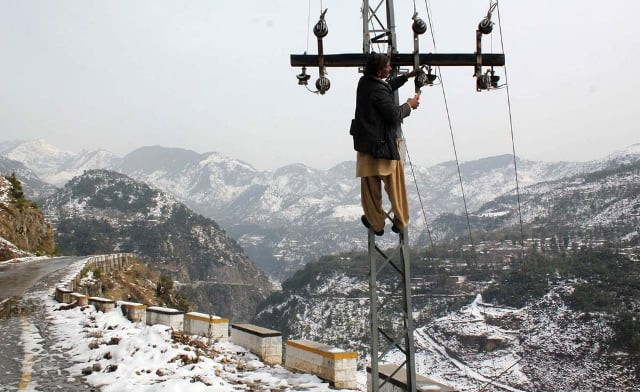After 39 years, Galiyat gets a snowy day in April
Environmentalist attributes weather change to deforestation, carbon emissions

A PESCO worker fixing a power line. PHOTO: APP
Residents of the area expressed their surprise and joy at the unexpected turn in the weather, which had just started turning warm.
The area had last received snowfall on March 10 when the plain areas received over a foot of snow while the hilly areas received over two feet of snow.
Heavy rains had started lashing different parts of Hazara division on Thursday, which continued intermittently on Friday. However, snow started falling unexpectedly in the Galiyat valley early on Friday and continued for much of the day.
The low-lying areas of Galiyat received between six to eight inches of snow while hilly areas such as Thandiyani and Ayubia received as much as 10 to 12 inches of snow.
Spring delayed: Passing winter dumps three feet of snow
Sardar Khalid Khan, a resident of Nathiagali, said that usually, snow stops falling during the first or second week of March every year. However, this year, the weather got warm unusually early before receiving a blanket of snow in April for the first time since 1978.
However, for some, the snow was more alarming than joyous.
Noman Ahmed, an environmentalist, attributed the new weather conditions to global warming as a result of deforestation – which has been rampant in recent years in the area.
He added that that increasing vehicular and industrial emissions coupled with denuding forests were the major contributing factors to climate change.
Ahmed lamented that despite tall claims from the government, tree felling in Abbottabad was continuing unabated causing landslides, hill torrents and disturbed weather patterns.
Pointing out how temperatures in Abbottabad city had reached record levels at the height of summer last year, the environmentalist said that the disturbed ecosystem would see the temperature this summer soar past last year’s record of 42 degrees Celsius.
Unless remedial measures are taken immediately, and if tree
felling continues at the same pace, he warned that the weather in Galiyat would become similar to that in Abbottabad city.
He recommended imposing a carbon tax on vehicle owners and
the funds generated should be spent on increasing forest cover.
Meanwhile, following the snowfall, the main Abbottabad-Murree Road remained blocked from Friday morning till noon owing to slippery conditions. Only vehicles with snow tyres and chains could ply the roads.
Intermittent snowfall was also reported in Balakot, Naran and Kaghan areas, while Kohistan also received rain.



















COMMENTS
Comments are moderated and generally will be posted if they are on-topic and not abusive.
For more information, please see our Comments FAQ